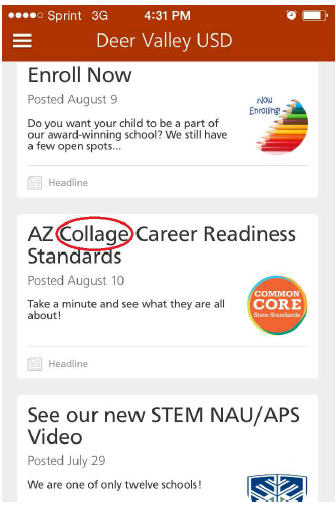Here is an ad correction to a Piggly Wiggly electronic ad that doesn’t seem to make things any better. At least their price is now correct–hopefully!

Here is an ad correction to a Piggly Wiggly electronic ad that doesn’t seem to make things any better. At least their price is now correct–hopefully!

 Here are some rather random facts that you may or may not know:
Here are some rather random facts that you may or may not know:
1. Did you know that an envelope should be addressed in all caps, with street direction and designation abbreviated (i.e., 315 W CENTRAL AVE), with no punctuation, with the addressee’s name and title on the first line, the name of the company on the second line, the street address and suite number on the third line, and the city, two letter state abbreviation, and ZIP code on the last line? Postal OCR machines read from the bottom up to decide where to send the letter to be delivered, so if you use this format, your letter may just get there before one in another format. See USPS Publication 28 for detailed information about addresses.
2. Did you know that in a business letter an attention line is not really necessary? If you are directing it to someone’s attention, just address it to them. There really is no need for the “Attention” unless you do not know someone’s name and want to address it to “Human Resources Manager” or something like that. But with technology and the availability of corporate information today, you may be able to figure out who that person is and get your letter delivered directly to a person instead of to the “Occupant” trash bin.
3. Did you know that irregardless is not a word you should be using? Use regardless instead.
4. Did you know that emails should be written in English and not in “text speak”? Of course you did! I was just testing you.
5. Did you know that ellipsis marks are three spaced periods (regardless of how Word wants to format them for you)?
6. Did you know that you should proofread pleading captions and titles, inside addresses and re: lines in letters, and other things that may not be obvious to the author, but someone will be looking at so it should be right? Some attorneys have their Word settings so that the spell checker does not check words with all caps–which includes most legal document titles–and so these areas are very often overlooked by the author, even though they are one of the first places the reader will go. You certainly don’t want to start your reader off with a careless typo when they have more of your writing to read, do you?
7. Did you know that emails are correspondence too? Clients, opposing counsel, and judges are all reading our emails. It is important that we take as much care with email as we do with correspondence. Email still reflects your firm, so it should be right.
Now you hopefully know one or two new things.
Do you have questions about things you come across regularly in writing and proofreading? Send an email to proofthatblog@gmail.com and we will get it in a future issue.
This one comes from Twitter. The confusion between to, too, and two is high, but signmakers need to do more than use the “that’s the way they gave it to me” excuse. Between a few people, one can hope that someone would get it right. Then again . . .

This was in my Facebook feed and is such a hot mess it makes my head hurt. Here are just a few of the problems I see: (1) not all legal secretaries are female; (2) not all women have long flowing manes (and the graphic is not entirely professional or appropriate); and (3) do the finest become legal secretarIES or do they become A legal secretary. I hope no one is paying money for this …

Copyright: gmf1000i / 123RF Stock Photo
A lot of specific legal phrases are Latin phrases or at least started out Latin. Latin, italics, and punctuation are more than a little confusing so we will take a little time today to try to make those things a little bit clearer.
The Latin word id. is always italicized (including the period following the “d”). Note that id. is used to refer to the immediately preceding citation in a document but ONLY when the immediately preceding citation contains only one authority. Also, if you are using id. in a footnote, it must be used only when the immediately preceding citation is within the same footnote or in the immediately previous footnote and that footnote contains only one authority. If you are responsible for cite checking documents, keep this in mind. And if you are responsible for typing documents, keep this in mind as well—in addition to italicizing the period after id. These are important (and overlooked) details.
Spero autem quod expediens erat! (I hope this was helpful!)
I found this one in an email I received. It was correct when I clicked on the link, but incorrect in the email. This is not a very good advertisement for a company that engraves things as their business. Just a little extra time can make all the difference in the world!

This picture was sent to me by one of my blog readers. I thought it was appropriate to share today. I’m guessing they were spelling phonetically. Have a good Halloween, don’t eat too much candy, and please be safe out there!

This one comes from Twitter. While my brain often actually reads this when I’m skimming a newspaper, I doubt it was really the intent of the newspaper to publish its headline this way.

As most of you know, I have a very low tolerance for errors by schools. I understand they are people too, but I hold them to a higher standard just because teaching proper grammar is part of their business and this kind of stuff isn’t that hard–just plain inattention. This Giggle was forwarded to me by a friend and I love receiving any Grammar Giggles you might find.

Remember–if you enjoy Proof That proofreading blog and the Grammar Giggles, you can sign up to get notifications of new postings in the upper right hand corner AND you can always share them with your friends and coworkers (we’ll call that a subtle hint!). If you have a pressing proofreading question or Grammar Giggle, forward it to me at proofthatblog@gmail.com for a possible future blog post.
I found this on Twitter. They say it was used in a presentation on proofreading. Whoopsie!
